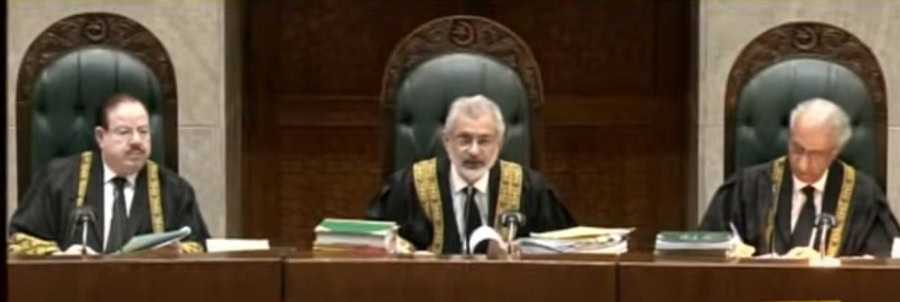ISLAMABAD – The Supreme Court will resume hearing on a set of petitions filed against the Supreme Court (Practice and Procedure) Act 2023, which limits the powers of the chief justice of Pakistan, after a short break today (Monday).
CJP Qazi Faez Isa-led 15-member comprising Justice Sardar Tariq Masood, Justice Ijazul Ahsan, Justice Syed Mansoor Ali Shah, Justice Munib Akhtar, Justice Yahya Afridi, Justice Aminuddin Khan, Justice Sayyed Mazahar Ali Akbar Naqvi, Justice Jamal Khan Mandokhel, Justice Muhammad Ali Mazhar, Justice Ayesha A. Malik, Justice Athar Minallah, Justice Syed Hasan Azhar Rizvi, Justice Shahid Waheed and Justice Musarrat Hilali is hearing the petitions.
Today’s hearing is historic as it is for the first time in history of country that proceedings of the apex court are being broadcast live.
Earlier in the day, CJP Isa chaired an informal full court meeting where matter related to live broadcasting of today’s proceedings were discussed.

Govt Submits Reply
The federal government has submitted its reply to the apex court, arguing that the petitions challenging the act are inadmissible as the government can make legislation under Article 191 of the Constitution. It pleaded the top court to reject the petitions.
The government said the law had not limit the freedom of judiciary, adding that no any powers have been withdrawn from the top court.
Background
Earlier this year, the PDM-led government approved a law related to the powers of the chief justice in matters of public interest. It also limit the suo moto powers of the top judge.
Regarding the constitution of benches, the Act stated that every cause, matter or appeal before the apex court would be heard and disposed of by a bench constituted by a committee comprising the CJP and the two senior-most judges. It added that the decisions of the committee would be taken by a majority.
Regarding exercising the apex court’s original jurisdiction, the Act said that any matter invoking the use of Article 184(3) would first be placed before the committee.
The law was later challenged in the apex court. On April 13, an eight-member bench of the top court stayed the implementation of the law.










